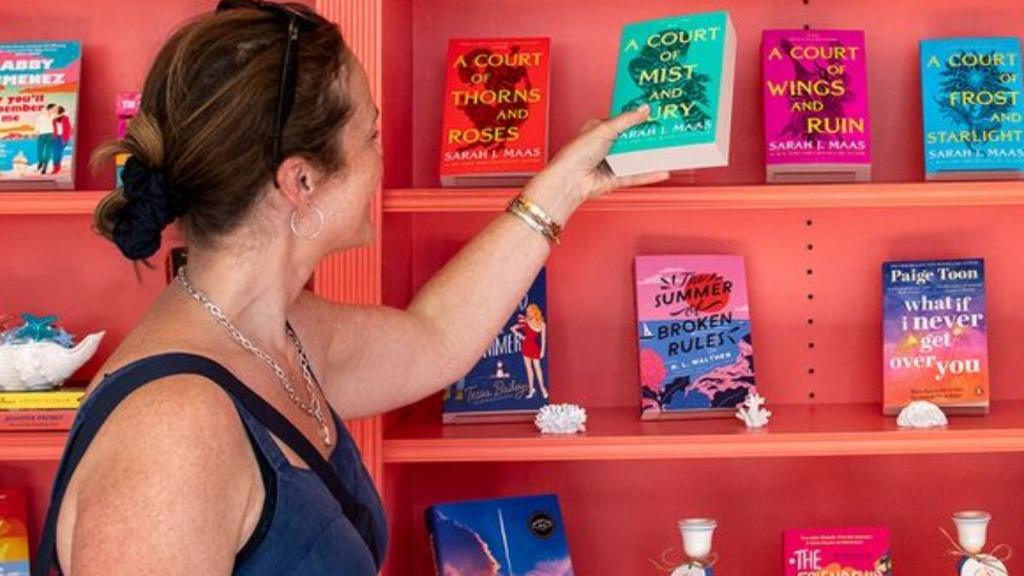At London’s first romance-only bookshop, Sarah Maxwell stands amidst the “smut hut,” a section showcasing the store’s more erotic offerings. Young women browse brightly colored paperbacks—titles like Just For the Summer and Swept Away—engaging in lively conversation.
Maxwell aims to challenge the genre’s detractors, often men, who dismiss what she considers “high-quality writing” as mere “smut.” “Many of these books boast strong world-building, compelling character development, and excellent plots,” she asserts.
A recent report revealed a surge in romance and fantasy sales, pushing UK fiction revenue above £1 billion for the first time. While this reflects a positive shift in attitudes, some believe ingrained sexism continues to marginalize the genre.
Romance fiction encompasses a vast array of subgenres, all revolving around captivating love stories with a guaranteed “happily ever after” (HEA), creating a comforting, cozy reading experience. Romantasy, a blend of romance and fantasy, thrives, boosted by BookTok’s influential reading community.
Popular series like Fourth Wing and A Court of Thorns and Roses feature female protagonists navigating high-stakes relationships within magical worlds. Readers frequently select books based on tropes like “enemies to lovers” and “second-chance romance,” with “spice level”—the degree of explicit content—often emphasizing female pleasure, power, and emotional connection.
Sky, 23, a self-described “proud romance reader,” attributes her love for the genre to childhood fanfiction and now relies on BookTok for recommendations. She and Chantelle, 24, acknowledge that not everyone shares their enthusiasm, encountering occasional eye-rolls and dismissive attitudes.
Caroline, 29, initially dismissed romance, but after reading Emily Henry’s Book Lovers, rediscovered the genre’s appeal. She describes the experience as “guilt-free” and “fun,” subsequently devouring A Court of Thorns and Roses.
Victoria, 31, appreciates romance and fantasy for their escapism, highlighting the universal desire for “happily ever afters.” While acknowledging lingering stigma, she believes open online discussions are changing perceptions, challenging the notion of romance as mere “guilty pleasure.”
Record sales in both romance and fantasy last year, as reported by NielsenIQ, demonstrate the genre’s commercial strength. Romance & Sagas sales jumped from £62 million in 2023 to £69 million in 2024, while Science Fiction & Fantasy saw even greater growth—from £59 million to £83 million.
Women under 35 account for over half of romantasy purchases. Literary agent Rebeka Finch compares this dedicated readership to Swifties, emphasizing their intense engagement and multiple purchases of the same book.
Sarah Maxwell, owner of Saucy Books, attributes her success to this devoted fanbase. Despite industry skepticism, she highlights the genre’s profitability, particularly among millennial women.
Despite commercial success, Rebeka notes persistent derision, especially toward “spicy” titles, often dismissed as “fairy porn.” She challenges this, emphasizing the portrayal of healthy sexual relationships within the genre.
Katie Fraser of The Bookseller magazine observes a shift within the publishing industry, driven primarily by commercial considerations. Romance’s once-maligned status is changing as readers become a significant economic force, prompting increased investment from publishers.
Author Bea Fitzgerald capitalized on this shift, successfully publishing her young adult rom-com during the romance boom. She notes past practices of categorizing romance books under other genres to avoid perceived audience limitations.
Bea highlights the current generation’s unapologetic embrace of the genre—reading, discussing, and actively engaging with the community. However, she observes a lack of critical appraisal, attributing this to the genre’s predominantly female readership and the prevalence of happy endings, suggesting a bias towards “serious” literature equating to tragedy.
Photos by Emma Lynch

